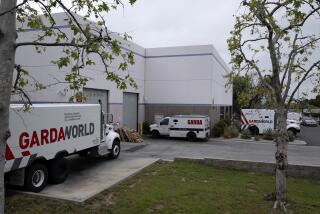Soldiers Stumble on Outrageous Fortune
BAGHDAD — Two Army sergeants went searching for saws Friday to clear away branches that were blocking their Humvees. But they stumbled across a sealed-up cottage that aroused their curiosity -- and ultimately led to the discovery of an estimated $650 million in cash.
The sergeants tore down a cinder-block and concrete barricade at the cottage door and found 40 sealed galvanized aluminum boxes lined up neatly on the stone floor. Breaking open one box, they were stunned to discover 40 sealed stacks of uncirculated $100 bills -- $100,000 per stack, or $4 million in the box. In all, the 40 boxes were assumed to contain $160 million.
But there was more.
In an adjacent cottage in an exclusive Tigris River neighborhood where senior Baath Party and Republican Guard officials had lived, the sergeants found another 40 aluminum boxes assumed to contain another $160 million in currency. In a matter of minutes, they had uncovered $320 million in cash.
“I need to call my wife and tell her we were multimillionaires for about three seconds,” Staff Sgt. Kenneth Buff said as he stood next to a box stuffed with sealed bundles of currency.
Their discovery set off a nighttime search of abandoned estates tucked among parks and canals. By 11 p.m., soldiers of the 3rd Infantry Division had found two more cottages containing at least 84 more boxes presumed to hold $336 million in cash, for a total of $656 million.
The loot apparently was hidden by fleeing Baath Party members and senior Republican Guard commanders who had lived in the wooded neighborhood just east of Saddam Hussein’s Presidential Palace. Commanders scrambled to secure the area overnight before word of the discoveries triggered a crush of fortune seekers.
Officials did not immediately confirm that the currency was legal tender, but an Army private here who said he had worked for an armored car company examined the bills and called them genuine.
Taylor Griffin, a U.S. Treasury spokesman, offered assurances that any cash retrieved from Hussein’s regime would be held aside for the people of Iraq. “If we find money and it’s not counterfeit, any assets belonging to Saddam Hussein and his cronies will be returned to the Iraqis,” Griffin said.
Soldiers of the division’s 4th Battalion, 64th Armor Regiment were ordered to stop searching the area shortly before midnight after commanders found that $600,000 was missing from an opened box. Officers said the cash was recovered in a tree and three soldiers were questioned.
The cash boxes were loaded onto trucks and escorted by military police to division headquarters at Baghdad’s international airport for counting and security. Commanders said they did not know the ultimate disposition of the currency. Cash recovered by the same battalion from a botched bank robbery Thursday was held for a new transitional government being formed, officers said.
The staggering sums illustrate the fabulous wealth accumulated by Hussein and his ruling elite. Searches of their luxurious homes in the two-mile-long palace complex over the previous week had found flashy automobiles, private zoos, expensive liquor, a cabin cruiser, huge weapons caches and gilded furniture, but very little reported cash.
Now it appears that Hussein’s top echelon and perhaps Hussein himself were unable to carry out all of the regime’s money when they fled the U.S. attack, and instead sealed the currency in the cottages near their homes.
Officers said they did not know the source of the currency. Each aluminum box was sealed with metal rivets and hard plastic straps. Green tags read, in English and Arabic: “Jordan National Bank,” followed by a serial number.
A former Iraqi government official who requested anonymity said the money almost certainly was stashed by members of the Baath Party’s upper echelon, perhaps at the direction of Hussein himself or one of his two sons, Uday or Qusai.
The former official said Hussein’s government received hard currency for virtually all of the oil smuggling that has provided a source of revenue not subject to United Nations oversight under the oil-for-food program.
At the time of the 1991 Persian Gulf War, the former official said, Hussein’s regime had accumulated $4 billion to $6 billion in cash.
“I suspect they have been stashing funds for some time just in case this war didn’t go well. I’m sure that if they keep searching, they’ll find lots of these galvanized steel boxes all over the place,” the former official said. “It’s either illicit money accumulated by Uday, who basically is in charge of the economy, trade, smuggling oil and what have you, or it was put there by the security people, who report to Qusai.”
Cash has been the preferred medium for all off-the-books transactions in Iraq because bank transactions have been monitored since the Gulf War, the former Iraqi official said. To transfer funds out of Iraq, government officials personally would transport it to a friendly country, where it would be deposited in bank accounts and, if desired, transferred electronically to other locations.
“This is the way these people operate,” the former Iraqi official said. “They take the money, secure it, and deposit it in Jordan or some other country where they have arrangements, say Tunisia or Yemen. From there, they shift it to places like Kazakhstan or Armenia.”
Many of the 7-inch $100,000 bundles were sealed in plastic shrink wrap and labeled “Boston series,” “New York series,” or “Richmond series,” corresponding to the Federal Reserve Bank in those cities. The labels also listed the serial numbers of the bills, which were sequential new notes, many dated 1999 or 2001.
Other $100,000 bundles contained previously circulated currency, some dating to 1993. They were tied with string and rubber bands, each accompanied by a handwritten note with Arabic numerals. On the doors of at least two of the cottages, someone had taped a note containing a signature and notations in Arabic.
Although luxury homes and compounds in the Presidential Palace complex have been searched several times by U.S. troops, soldiers have only recently begun moving through the neighborhoods of palm trees and flower nurseries about a mile east of the palace on the west bank of the Tigris. The 4th Battalion, whose soldiers discovered the cash Friday, moved its command post from the Presidential Palace into a two-story mansion along the river Tuesday.
Since then, Buff said, he and other battalion soldiers have driven past the cottages many times. But because the small structures were partially obscured by flowering trees and rose gardens, no one noticed that their doors and windows had been sealed, apparently recently, with cinder blocks and concrete.
“We all must have gone by there a hundred times,” Buff said. Buff and Sgt. 1st Class Daniel Van Ess said they stumbled on the cottages about 2:30 p.m. Friday when they got lost looking for a gardener’s shack where Buff had seen two saws the day before. The sergeants had been ordered to cut down overhanging tree limbs that bang against passing Humvees and trucks.
When they noticed the crudely built cinder-block and concrete barricades sealing all openings to the cottages, they grabbed a crowbar and smashed through one barricade. Inside they found two small bedrooms with no furnishings, two well-scrubbed bathrooms and the 40 boxes of cash on the floor.
“We got suspicious because it just didn’t seem right,” Buff said. “We couldn’t see any windows or door, but they had an air conditioner. It didn’t add up.”
When they pried open the first box, Van Ess said, “We were in shock. I think we’ll be in shock for a while.”
When news of the discovery reached the battalion command post in the mansion a few hundred yards away, 1st Sgt. Eric Wilson said, it got him thinking about a similar sealed-up cottage he had driven past the day before. He rounded up three men at dusk and they smashed the barrier with a sledgehammer.
Wilson said he was only mildly surprised when one of the boxes was opened and $4 million in a mix of circulated and uncirculated bills was found. Inside the cottage a reporter saw a total of 37 boxes believed to contain $4 million each, or $148 million in all.
Pfc. Justin Davis was overwhelmed. “We kind of figured we’d find something in there, but still, seeing all that money and all those boxes, it was breathtaking,” he said
Friday night, soldiers from the battalion said they had found yet another barricaded cottage containing 47 boxes filled with an estimated $188 million in U.S. currency.
As Wilson and his men waited in the dark for a truck to arrive, the sergeant sat on a box they had opened. He and his men joked about trips to Las Vegas and about buying new houses.
Finally, Staff Sgt. Shelby Cross spoke of how difficult it was to stand and stare at millions of dollars. “It’s a hard choice, but not a hard choice, you know?” he said. “You just have to do the right thing.”
When the truck arrived, Pfc. David Lauderman, who said he once worked for an armored-car company, inspected the notes. Their watermarks appeared genuine, and they contained thin metal strips designed to foil counterfeiters.
“Watermarks, metallic strips, the ink doesn’t rub off. It’s our currency, genuine U.S. cash,” Lauderman said.
Buff and Van Ess, meanwhile, had to walk back to the command post from the two cottages where they had made the first discovery. An Iraqi truck they had hot-wired and refurbished a few days earlier had been commandeered to take the 80 boxes and $320 million they had found to the division’s airport headquarters.
They found a Humvee and headed to the highway in time to see military police vehicles escorting their truck toward the airport. They sat and watched, forlorn, as the truck they had lovingly brought to life disappeared in the evening dust.
“They can have the money,” Buff said at last. “Just give us our truck back.”
*
Times staff writer Warren Vieth in Washington contributed to this report.
More to Read
Sign up for Essential California
The most important California stories and recommendations in your inbox every morning.
You may occasionally receive promotional content from the Los Angeles Times.











